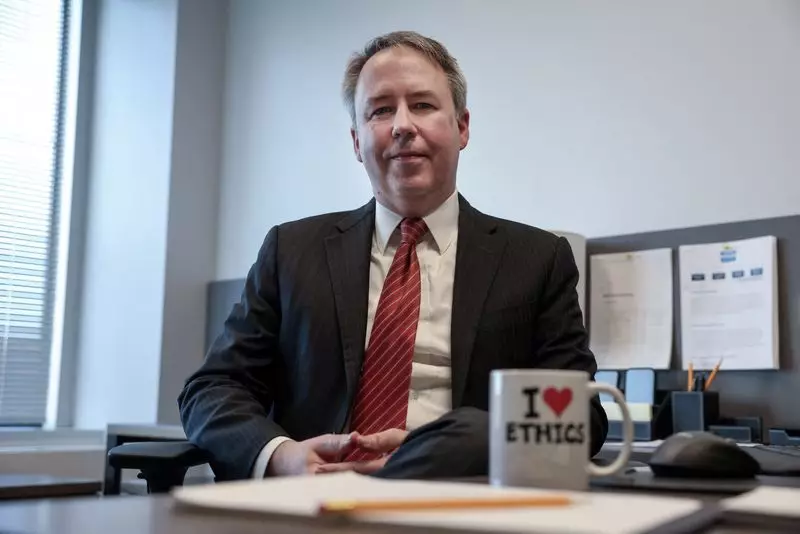As the United States braces for another presidential transition, the Office of Government Ethics (OGE) finds itself amidst heightened scrutiny. This small agency, comprised of about 75 employees, operates in a landscape fraught with potential conflicts of interest arising from the intricate web of financial disclosures, business ties, and personal interests of incoming government officials. Under the stewardship of David Huitema, who formally assumed his role in December 2022, the OGE faces a complex landscape, particularly given the ongoing challenges presented by former President Donald Trump’s administration and its proclivity for intertwining business and governance.
The primary mandate of the OGE is to ensure that federal employees make decisions that prioritize the national interest over personal financial gain. This objective becomes increasingly pertinent during transitions when new appointees must navigate the labyrinth of ethics laws and disclosure requirements. Huitema’s experience as the ethics chief at the U.S. State Department should ideally be an asset in this endeavor, yet the historical precedent set by his predecessor, Walter Shaub, looms large, filling the air with skepticism regarding the efficacy and resilience of the OGE.
The Challenge Ahead
David Huitema is expected to tackle a slew of ethical obligations as new Senate-confirmed nominees prepare for their roles. The financial disclosure process, which requires nominees to report their personal financial holdings, is one of his immediate responsibilities. This undertaking is not just procedural; it reflects a broader societal expectation for transparency in government. Nominees are mandated to submit these disclosures within five days of their nomination, allowing the OGE time to assess potential conflicts before the Senate deliberations.
However, there are notable limitations to the OGE’s oversight capacity. Significantly, individuals like billionaires Elon Musk and Vivek Ramaswamy, who are not official government employees but serve as outside advisers, fall outside the OGE’s jurisdiction. Their influence and potential conflicts remain largely unmonitored, raising questions about the integrity of government decision-making processes. Huitema acknowledges the complexity of assessing conflicts and the subsequent implications for federal governance but remains focused on equipping incoming officials with the knowledge necessary to navigate potential ethical pitfalls.
A key aspect of Huitema’s role is fostering public trust in the ethical framework governing federal employees. The OGE has mechanisms in place that allow any citizen to request copies of financial disclosure reports filed by government nominees. This transparency is intended to enhance public oversight, enabling citizens to participate in the monitoring of their leaders’ financial interests. However, the potential for cynicism about the ethics of public service remains high, particularly in an era when distrust in government institutions is pervasive.
Huitema has expressed a belief that most incoming officials possess an earnest desire to adhere to ethical standards. However, his optimism must be tempered by the realities of a political environment marked by a pervasive culture of skepticism toward ethics agencies. The challenge lies not only in the enforcement of ethical conduct but also in reshaping perceptions regarding the importance of ethics in governance.
Reflecting on his prior experience, Huitema notes that the majority of government employees—whether they are career professionals or political appointees—are inclined to follow the law and act with integrity. However, the open question remains: can ethics truly be taught in an environment that nurtures self-interest? This dilemma is particularly complicated for appointees transitioning from the private sector, where the culture often prioritizes networking for personal gain over the ethical considerations that govern public service.
The OGE must navigate these challenges by offering effective ethics training and resources that foster a cultural shift toward integrity and accountability among new appointees. Moreover, the delicate balance between enforcing ethical standards while navigating political pressures, especially those emanating from the highest echelons of government, poses a continual test for Huitema and the OGE.
As the nation prepares for another round of political shifts, the efficacy of the OGE depends significantly on Huitema’s ability to uphold the principles of transparency, public trust, and ethical governance amidst the often tumultuous sea of politics. In doing so, he may play a pivotal role in reaffirming the public’s faith in government institutions—a task made all the more challenging by the layered complexities of financial disclosures and conflicts of interest inherent in any presidential transition.

